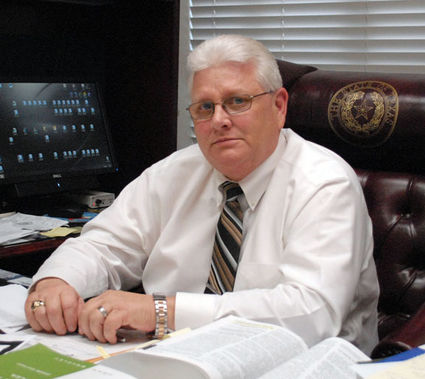Judge David Peck, former prison guard of a Nazi criminal
Last updated 8/11/2011 at Noon
Born in Orange and raised in the Louisiana Boys Village in Lake Charles, La., David Peck, now Precinct 1 Justice of the Peace really didn’t know where life would take him. He left the home when he turned 18 and joined the Army in April 1971.
In 1972, instead of being shipped to Vietnam, he and his company were sent to Germany to become part of the Berlin Brigade. While there, they were to rotate guarding Spandau Prison with soldiers from the Four Powers, the United States, the United Kingdom, the Soviet Union and France.
The prison housed one man: Rudolf Hess, who was, at one time, the Deputy to Adolf Hitler.
Born in Egypt on April 26, 1894, he became a prominent Nazi politician in the 1930s and early 1940s. On the eve of war with the Soviet Union, he flew to Scotland in, what he explained to be, an attempt to negotiate peace with the United Kingdom, but he was captured and became a prisoner of war.
He was later tried at Nuremberg and sentenced to life in prison. He and six others tried at Nuremburg were sent to Spandau Prison in Berlin. Hess served the longest sentence at Spandau as the other six were released due to health problems.
While in prison, it is said that Hess referred to himself as the Fuehrer of the Fourth Reich and so became an icon of the neo-Nazi moment. Some have even labeled him a “martyr of peace.”
The Four Powers took turns regulating and guarding the prison and Peck said that the soldiers spent four hours at a time in the guard tower.
“I saw [Hess] one time on my watch, he was walking in the courtyard,” Peck said. “But I didn’t have a clue who he was.”
Hess was allowed 30 minutes a day to walk the courtyard of the prison and no one was allowed to have any contact with him. The soldiers weren’t even allowed to take pictures, though some pictures of the prison and a few of Hess can been seen on different websites today.
After one of Peck’s shifts in the Tower Guard, he and a couple of buddies broke the prison rules and snuck down to the dungeon. There they saw the chains, guillotines and other devices used to torture the former inmates. It wasn’t long before Peck and his friends were caught and escorted out of the dungeons.
The sight of those devices and the wall where prisoners were lined up, shot and killed still remain fresh in Peck’s mind.
“I remember that wall was just riddled with bullet holes,” he said. “Later in life I realized [everything] I had seen and that I had become a part of history that I didn’t have any idea about.”
Peck explained that as a kid, he couldn’t understand why they were to guard a prison that housed only one man. He understood why there was a military presence for the conflicts between West and East Germany and he understood why they needed to dispose of bombs and ammunition in West Germany. However, it wasn’t until many years later that he finally understood just how important it was that the Four Powers guard Spandau Prison.
On Aug. 17, 1987, at the age of 93, Hess was found dead in a summer house in a garden at the prison. His death was ruled a suicide but there are many conspiracy theories surrounding his death. He was buried in a cemetery in Wunsiedel, Germany.
Shortly after his death, Spandau Prison was demolished, ground to a fine powder and were scattered in the North Sea to prevent the prison from becoming a shrine to the neo-Nazis.
On July 22, the New York Times reported that the bones of Hess were exhumed, burned and scattered over an undisclosed location at sea because his grave in a small Bavarian town had become somewhat of a pilgrimage site for neo-Nazis.
Peck got out of the service in April of 1974 and enrolled at San Jacinto College in Pasadena, Texas and took a job working as a night security guard for a construction site.
He learned of a job opening at La Porte, Texas for a police officer from some fellow classmates, who were also police officers. Peck applied for the job and got it. He was student during the week and a police officer on the weekends. He came back to Orange County in 1976.
During his law enforcement career, Peck has served a Deputy Director for the Mutli-County Drug Task Force and a Chief of Police in the state of Tennessee.
In December of 2008, Peck retired from as a Captain from the Orange County Sheriff’s Department. He was elected Justice of Peace for Precinct 1 in March 2010 and took office in January 2011.
“It’s different on this side of the fence,” Peck said. “It’s very interesting and I find it more complex. I find that you must do a lot more studying and that takes up a lot of time.
“I ask the good Lord every day for guidance in my life because as a judge, all things are difficult before they get easy,” Peck said. “I have learned that more people would learn from their mistakes if they were not so busy denying them.”
Of all the things Peck has been able to see and do, he feels most blessed to have the former Patsy Ellis as his wife and best friend.








Reader Comments(0)